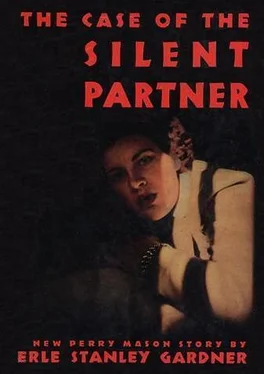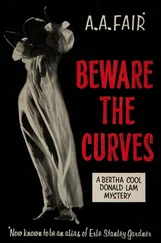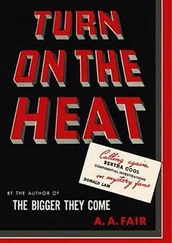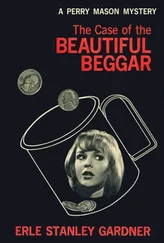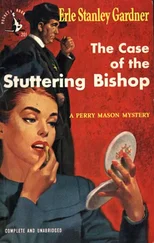Erle Gardner - Case of the Silent Partner
Здесь есть возможность читать онлайн «Erle Gardner - Case of the Silent Partner» весь текст электронной книги совершенно бесплатно (целиком полную версию без сокращений). В некоторых случаях можно слушать аудио, скачать через торрент в формате fb2 и присутствует краткое содержание. Город: New York, Год выпуска: 1940, Издательство: William Morrow, Жанр: Классический детектив, на английском языке. Описание произведения, (предисловие) а так же отзывы посетителей доступны на портале библиотеки ЛибКат.
- Название:Case of the Silent Partner
- Автор:
- Издательство:William Morrow
- Жанр:
- Год:1940
- Город:New York
- ISBN:нет данных
- Рейтинг книги:4 / 5. Голосов: 1
-
Избранное:Добавить в избранное
- Отзывы:
-
Ваша оценка:
- 80
- 1
- 2
- 3
- 4
- 5
Case of the Silent Partner: краткое содержание, описание и аннотация
Предлагаем к чтению аннотацию, описание, краткое содержание или предисловие (зависит от того, что написал сам автор книги «Case of the Silent Partner»). Если вы не нашли необходимую информацию о книге — напишите в комментариях, мы постараемся отыскать её.
Case of the Silent Partner — читать онлайн бесплатно полную книгу (весь текст) целиком
Ниже представлен текст книги, разбитый по страницам. Система сохранения места последней прочитанной страницы, позволяет с удобством читать онлайн бесплатно книгу «Case of the Silent Partner», без необходимости каждый раз заново искать на чём Вы остановились. Поставьте закладку, и сможете в любой момент перейти на страницу, на которой закончили чтение.
Интервал:
Закладка:
She broke off as she saw the group in the corridor, then laughed, and said, “Well, excuse me! Why didn’t you tell me there were men in the party?”
She said, “Just a minute,” stepped back into the apartment, and picked up a robe which hung over the back of a chair. She slipped it on and said, “Come on in. You should have told me you weren’t alone, Miss Faulkner.”
Mason stepped forward. He asked, “You know Lieutenant Tragg?”
“Oh, yes. I saw him before I left the hospital. They wouldn’t let me leave until I had permission of the police.”
There was an awkward pause. Tragg looked at Mason, and Mason said abruptly, “Miss Dilmeyer, I think you’re in some danger.”
“I — danger?”
“Yes. Murder — so you won’t get on the stand tomorrow.”
“What makes you think so?”
He said, “Don’t forget an attempt has already been made to murder you. Whoever tried then is just as anxious to get you out of the way now as he was a couple of days ago.”
She laughed. “To tell you the truth, I hadn’t thought much of anything about it.”
“If some person had a desire to kill you forty-eight hours ago, I know of nothing which has happened in the meantime that would cause him to change his mind,” Mason said.
Esther tapped a cigarette on the arm of the chair, and said, “You’re probably more concerned about that than I am.”
“Perhaps so. That’s because I think that the person who sent you the candy is the same person who murdered Harvey Lynk.”
She raised her eyebrows. “Well, isn’t that a bright idea!”
Mason said, “We have several clues to work on. I don’t know whether Lieutenant Tragg told you all of them.”
“I didn’t,” Tragg said.
“To begin with,” Mason observed as Esther Dilmeyer struck a match and held it to the end of her cigarette, “the address on the wrapper was typed on the typewriter in Mr. Lynk’s office at the Golden Horn.”
She shook out the match with a quick, nervous gesture. Her eyes showed that the statement came as something of a shock. “How in the world do you know that,” she asked, “—unless someone saw the thing being typed?”
“Many people don’t know that typewriters are more highly individualized than a person’s handwriting,” Mason said. “Any typewriter which has been in use for even a short time has a distinct individuality. The type gets out of line. An expert can compare samples of typing and tell absolutely whether they were done on the same machine.”
Esther Dilmeyer said, “I didn’t know that.”
“That’s one thing,” Mason went on. “The other is that the paper was taken from Lynk’s office.”
“How do you know that?”
“Papers vary as to rag-content, weight, chemical composition, and trade-mark. Trade-mark is usually water-marked directly into the paper.”
“Anything else?” she asked.
Mason said, “The label was pasted on with glue. The glue was similar in composition to some that is used at the Golden Horn, and, most important of all, the glue had set so thoroughly that the police were able to tell that the label had been put on at least forty-eight hours before the package was sent.”
“Well,” she said, “I guess the police are a lot smarter than I’d ever thought they were.”
“They are,” Mason commented dryly.
“Anything else?” she asked.
“Yes. Bear in mind that the label was prepared for the candy more than forty-eight hours before it was sent to you. Now, you’ve worked in a candy factory. You know something about what a job it is to tamper with chocolate creams, and then leave them so perfectly finished in appearance that there wouldn’t seem to be anything wrong.”
“Yes, I can appreciate that. It wouldn’t be such a difficult job if one knew how, but it’s no job for a bungler.”
“Now also bear in mind that the card which accompanied the candy was one which had previously been enclosed with an orchid corsage sent to you.”
“Either that or it’s an exact duplicate,” Esther Dilmeyer said, avoiding Mildreth Faulkner’s eyes.
Mildreth laughed. “I certainly hope you don’t think that I went back and sent the candy with another card.”
Esther Dilmeyer didn’t look at her. She said to Perry Mason, “I’m only answering questions so we can help get the thing cleared up.”
The smile left Mildreth Faulkner’s lips. “Then you do think that I sent you the candy?” she asked.
Esther said, “I like to live and let live.” She turned slowly to face Mildreth Faulkner. “I don’t want to make any accusations or insinuations, but just the same that certainly looked like your handwriting on the card.”
“Why, I never...”
“Easy, Miss Faulkner,” Mason warned. “Let’s develop the facts a little bit before we start looking for the person who sent that candy. Now then, Miss Dilmeyer, when you got that candy, and saw the card on the inside, you felt completely at ease. Is that right?”
“Yes, naturally. I’d met Miss Faulkner, found her very charming, and sympathetic — although she had grounds for being otherwise if she wanted to be — well, you know, narrow-minded about things and hold me responsible for things which were entirely beyond my control.”
“I see, but that possibility hadn’t occurred to you at the time you received the candy?”
“No. I thought she was a very nice person. She was going to give me a job, and I felt very friendly and — well, loyal.”
Mason said, “Let’s see where that leaves us. The person who sent the candy was someone who had access to virtually everything at the Golden Horn, someone who could use Mr. Lynk’s typewriter, open the desk drawer, take out some of Lynk’s stationery, use the glue pot, someone who knew something about the manner in which packages were handled at the package-delivery service during the rush hour; and, last of all, someone who was able to get that card which had been sent with the orchids and put it in the candy before the candy was delivered to the messenger service. That was an interval of less than thirty minutes. That calls for rather fast work.”
“Unless,” Esther Dilmeyer said, and then stopped.
“Unless what?”
“Unless Miss Faulkner was the one who sent the candy. If she did, there were two cards, and... and... well, that’s all there is to it.”
Mason said, “I’ve carefully investigated Miss Faulkner. She would have been unable to have sent the candy even if she’d wanted to.”
“What do you mean?”
“She hasn’t had sufficient experience with handling chocolates to have doctored the candy for one thing, and for another, she didn’t have any access to the Golden Horn forty-eight hours prior to the time the candy was sent. No, there’s only one person who meets all of those requirements.”
“Who?” Esther Dilmeyer asked.
“You,” Mason said quietly.
She half rose from her chair. “Me! You mean...”
“I mean,” Mason went on, “that you were the only one who could have sent that candy. You sent it to yourself.”
“And then ate a lot of poison just to put myself in the hospital?” she asked sarcastically.
Lieutenant Tragg leaned forward, started to say something to Mason. Mason, without taking his eyes from Esther Dilmeyer, said, “Shut up, Tragg,” and then to Esther Dilmeyer, “You didn’t eat any drugged candy.”
“Oh, I didn’t?” she said. “I just wanted to get a ride to the hospital. I was pretending to be asleep and fooled the doctor, is that it?”
“No. You took a big dose of veronal, but you didn’t get it in the candy.”
She made a show of irritation. “Listen, I’ve got some things to do tonight. I understand that you saved my life. At any rate, you paid my hospital bill. I felt grateful to you, but you have bats in your belfry, and I haven’t all night to sit here and listen to you spout a lot of theories.”
Читать дальшеИнтервал:
Закладка:
Похожие книги на «Case of the Silent Partner»
Представляем Вашему вниманию похожие книги на «Case of the Silent Partner» списком для выбора. Мы отобрали схожую по названию и смыслу литературу в надежде предоставить читателям больше вариантов отыскать новые, интересные, ещё непрочитанные произведения.
Обсуждение, отзывы о книге «Case of the Silent Partner» и просто собственные мнения читателей. Оставьте ваши комментарии, напишите, что Вы думаете о произведении, его смысле или главных героях. Укажите что конкретно понравилось, а что нет, и почему Вы так считаете.
